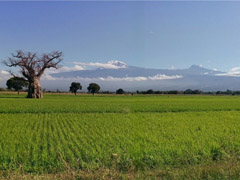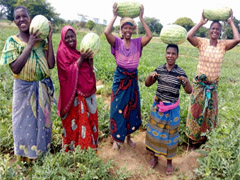Agriculture sector has been playing an important role as a key driver for economic growth of Tanzania since independence and accounts for approximately 65% of the population depends on both directly and indirectly. The sector contributes about 28 % of the country's GDP and about 24% of the total exports, and ensures food security in the country (FYDP3, 2021). However, these facts literally mean that two thirds of Tanzanians are working to produce only one third of the country's GDP.
It should be noted that the poverty rate of the rural area amounts to 31.3% while that of urban area is 16%. In this sense, agriculture development plays an integral part not only in economic growth but also in poverty reduction in this country. However, the growth rate of agriculture for the past several years (4-5%/year) has failed to achieve the national target (6-10%/year) and poverty reduction is also lagging behind (WB, 2019).
Based on this background the Government of Tanzania established the Agricultural Sector Development Program (ASDP) as a framework for agricultural development and it has been promoting agricultural development under the program. JICA, as one of the development partners, which contributed in the formulation of ASDP, continuously supports the effective implementation and further strengthening of the framework of ASDP through financial and technical assistances. Currently the Government of Tanzania in collaboration with development partners including JICA is implementing the second phase of the program (2017/2018 - 2022/2023) which focuses on four components: i) Sustainable Water and Land Use Management, ii) Enhanced Agricultural Productivity and Profitability, iii) Commercialization and Value Addition, iv) Sector Enablers, Coordination and Monitoring & Evaluation.
Also, Tanzania is one of the first group countries in the Coalition for African Rice Development (CARD) which is a consultative group of bilateral donors and regional and international organizations working in collaboration with rice-producing African countries. The Government formulated the National Rice Development Strategy (NRDS phase 1 and 2), which aims at increasing rice production in Tanzania from 0.9 million Metric Ton (MT) to 2.2 million metric ton (MT) in NRDS phase 1 and now is targeting to further double rice production from 2.2 million MT to 4.4 million MT by 2030 in NRDS phase 2.
To enhance and accelerate the implementation of CARD and NRDS, JICA keeps on promoting irrigation development, human resource development as well as dissemination of irrigated and rain-fed rice cultivation technologies.
In addition, JICA is promoting the commercialization and industrialization of the sector to align it with the priorities of the country, thus contributing to the growth of the whole economy of Tanzania. One particular example of our endeavor is being undertaken with Smallholder Horticulture Empowerment and Promotion (SHEP) approach, where the mindsets of farmers are being transformed into "Grow TO Sell" from just "Grow AND Sell". The strategic production and marketing under SHEP approach shall increase the income and strengthen farmers.


-
History of JICA cooperation in Tanzanian Agriculture Sector (PDF/400KB)
- Major projects in Agriculture Sector
- Good Stories in Irrigation Development
-
Rice Farming Trainings at Ministry of Agriculture Training Institute, Tanzania (PDF/1.66MB)
- Agriculture sector video (2019) (YouTube, external link)
- Facebook article





scroll